By Abebe Gellaw
It has come to my attention that my brief Facebook comment regarding a few controversial statements made by Jawar Mohammed has been posted on ECADF’s website as an article. I had no intention of writing a series piece on the issue. Quite obviously, there is a big difference between a well-thought out lengthy commentary and a brief message in a particular context.
My intention was just to appeal for calm and harmony, a necessary effort lacking in our political discourse. Often times, a message without its context is open to misinterpretation and misunderstanding. So there seems to be a need to clarify.
Politics, as far as I understand, is a mechanism of managing conflict of interests. It is a means of building consensus through dialogue and compromise. Since the early 1960s, the major political conflict in Ethiopia has been between ethno-nationalists and nationalists. The forces on both ends of the political spectrum have not still found a middle ground that can bring them towards consensus and compromise.
My understanding is that Jawar is an ethno-nationalist. As an ethno-nationalist, he says he is an Oromo first. Unlike him, I am a nationalist. But that is not the major problem. The problem is the way he has chosen to articulate and present his views in question that have been widely perceived as inflammatory and divisive.
I firmly and fervently believe that I am an Ethiopian first. I do not wish to allow the ethnic origin of my predecessors and parents to define me as a human being and overshadow my Ethiopian identity.
Jawar said Ethiopian identity was imposed on him. On the contrary, I argue that such a position is fundamentally flawed. Nowhere in the world is anyone given choices of national identity.
The Chinese-American writer, Eric Liu, once said: “The next time someone uses denial of citizenship as a weapon or brandishes the special status conferred upon him by the accident of birth, ask him this: What have you done lately to earn it?” Our predecessors, who have bequeathed us a country called Ethiopia with all its faults, challenges and problems, have made huge sacrifices in blood and flesh so that we’ll never be stateless. We should rather make sacrifices to reclaim our country and make our citizenship more meaningful by winning our rights, as citizens, to live in our country with full dignity, freedom and equality. We should make Ethiopia a country where every citizen and ethnic group is equal.
Unfortunately, our birthplaces also define the major problems and opportunities we inherit. Ethiopia is not a perfect nation. Far from it, it is defective and faulty as a result of the age-old tyrannies and injustices we have been condemned to suffer collectively.
Like any nation, it offers unique challenges as well as opportunities. With all its problems and baggage, Ethiopia is a nation of 80 million people. Our destiny is intertwined. We are diverse and yet we are all Ethiopians, whether we like it or not. I believe that rejecting Ethiopia as our country is not a solution to any of the problems we are supposed to confront. We should rather make strenuous efforts to reconstruct Ethiopia as a country where all of its citizens live in freedom, harmony, justice, peace and prosperity.
In the new Ethiopia we envision, there should be no room for inequality, injustice and tyranny. It should never be a prison for its children, regardless of their political, ethnic or cultural backgrounds. No ethnic or political group should be allowed to impose hegemony at the detriment of the majority.
The worst challenges all citizens of Ethiopia, except the oppressors, face are political oppression, grinding poverty, indignity, inequality, injustice and discrimination, just to mention a few among so many. At this time and age, what has been imposed on us is not national identity but the tyranny of the TPLF, an extremist ethno-nationalist group whose aim was nothing more than seceding Tigray. That is why we should continue struggling to throw off this backbreaking tyranny from our shoulders.
As I have clearly stated in another Facebook post, addressed to Jawar, “No nation-state was formed through consensus and democratic deliberations. Nation-states emerged out of conflicts, conquests, occupations and colonialism. While almost all African states were created by the colonial powers, Ethiopia was formed through internal processes. It was a painful process but not even as painful as what Native Americans and Europeans, who had gone through two devastating [world] wars.”
“We Ethiopians do not need to be bitter about the past. We are not part of the old history. But we certainly need to preserve our country and make it a nation for all correcting past injustices and mistakes. We need to move forward with a united spirit. As long as we can bring about real equality, justice, freedom and democracy, we will be fine. That is what we should all fight for rather than dwelling on the past [and gnaw old bones]. It is the present and the future that really matter….”
While I called for unity rather than condemning each other, making such inflammatory and controversial statements that turned out to be divisive are not only wrong but also damaging to our common cause for freedom. I said Jawar had misspoken. The dictionary definition of misspeak is not to endorse or approve. It means, “To speak mistakenly, inappropriately, or rashly.” I think that should be clear enough. It was particularly wrong for Jawar to speak in such a divisive ethno-religious tone at a time when we desperately need to unify to overcome and overwhelm the divide-and-rule tyranny of the TPLF. That is where he misspoke, in my humble opinion, without completely disregarding so many positive contributions.
I was under the impression that calling for sanity and unity at this critical juncture in our struggle would not also be misconstrued as a sign of weakness. I always see myself as a moderate. Compromise for the sake of the greater good is at times a mechanism to avoid unnecessary conflict and feelings. Even if that was my intention, I believe that we Ethiopians should never compromise on anything that undermines our unity, freedom, harmony and peace.
After all, our aspiration is to rebuild a united nation that will accommodate every citizen as equal and guarantee the freedom of every individual citizen including those who believe that they are the byproducts of their cultural and ethnic heritage. For that to happen, we need to preserve Ethiopia, a country that we will all be proud of when we claim our freedom despite its troubles and predicaments.
Anyone is not entitled to apologize on behalf of Jawar. If any apologies are needed, no one but only Jawar is entitled to make. As far as I am concerned, I am nobody’s apologist.
That said, I will be disingenuous if I do not repeat my main message. Let us move on with a united spirit and focus on our just cause for freedom, equality and justice. That is much more important than the war of attrition and divisiveness that is derailing our gains. Whenever we have problems, we should first have the courage to address them in a civilized manner. Again let us move on united as Ethiopians…
I am Ethiopian first
Latest from Blog

Amhara Exclusion in Ethiopia: Unpacking the Political Dynamics
The political marginalization of the Amhara people in the Horn of Africa can be largely traced to the strategic actions of the Tigray People’s Liberation Front (TPLF) and the Oromo People’s Party

With Jawar’s Political Conversion Oro-Mara 2.0 Can be Boy-King Abiy’s Graveyard
Yonas Biru, PhD Two things rattle the Boy-King’s confidence in maintaining the levers of power. But his opponents are oblivious. For those who care to listen, he has publicly announced what he
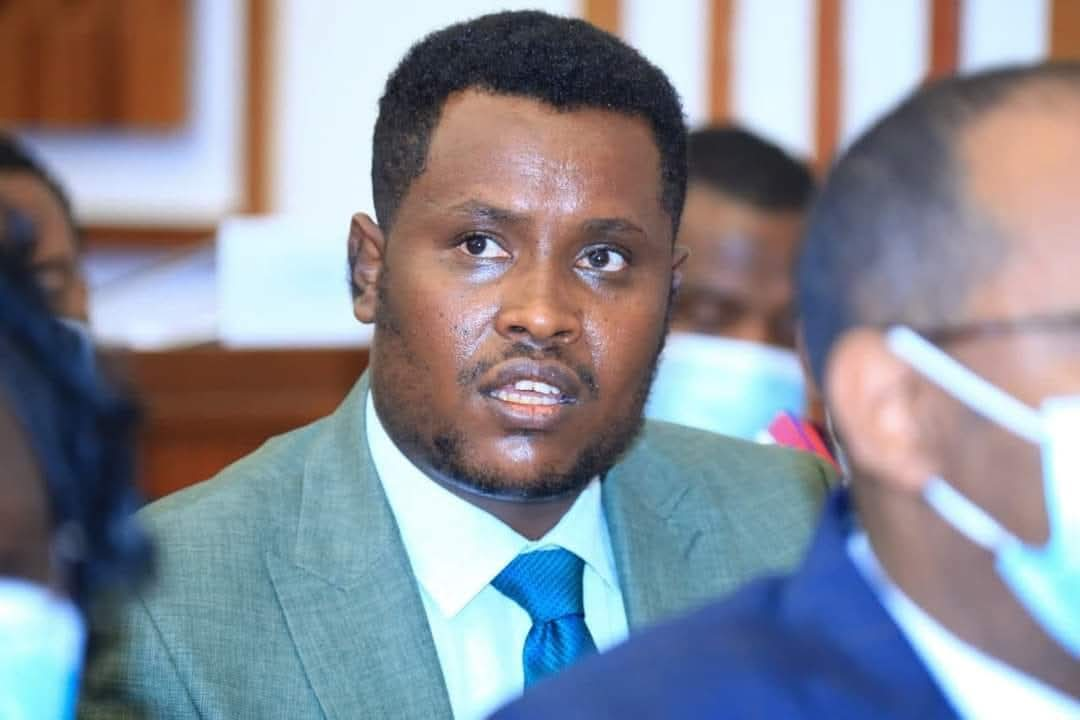
Justice for Christian Tadele Tsegaye: A Call to the International Community
Christian Tadele Tsegaye, a leading opposition figure and spokesperson for the National Movement of Amhara (NaMA), has become a victim of severe political persecution under the regime of Prime Minister Abiy Ahmed.

Can Ethiopia Change Course and Save Itself from the Devastating Outcomes of Ethnic Politics: Proliferation of Conflict, Underdevelopment, and Slide into Mass Poverty
An October 2024 United Nations Development Program (UNDP) report on Ethiopia paints a country gripped by dire multidimensional poverty crisis, afflicting a substantial portion of the population. The UNDP assigns a multidimensional

A demon by the Bank of the Blue Nile River
By Aschalew kebede Abebe The Triangular Entanglement It had been more than a century since the foundation of the conspiracy theory had lain down. It had begun when Theodore Herzl proposed to
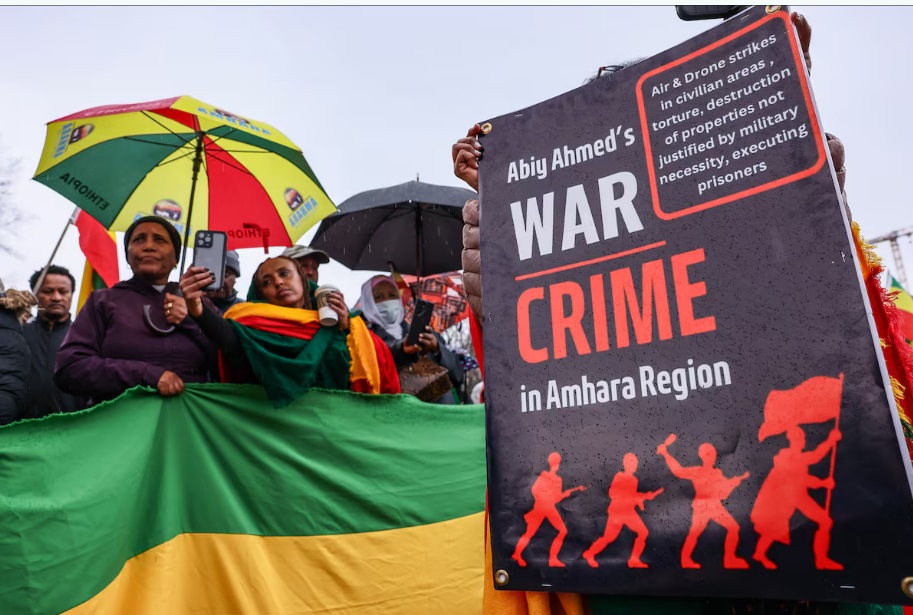
Ethiopian Soccer Stadium Transformed into Artillery Site Amid Amhara War
Zecharias Zelalem Special to The Globe and Mail Published December 19, 2024 Soldiers with the Ethiopian National Defence Force travel on a truck near Aykel, in the Amhara region, on Feb. 27.MICHELE SPATARI/Getty

Jawar’s Interview with BBC Undermines His Project to Rebrand His Image
Yonas Biru, PhD For nearly half a century, Oromo and Tigray tribal intellectuals have been and continue to be the curse of Ethiopia. Over the last six years, Amhara tribal intellectuals have
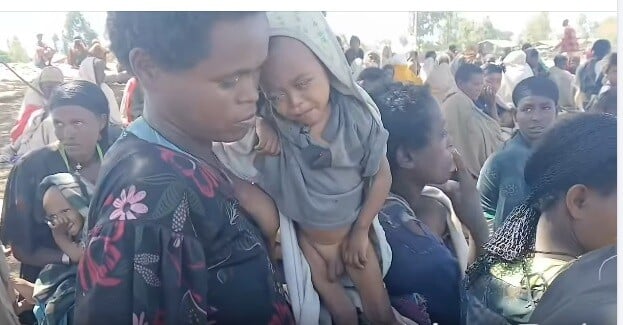
The administration of Abiy Ahmed is utilizing starvation as a tactic of warfare, which amounts to a war crime
( The Habesha ) The administration of Abiy Ahmed is utilizing starvation as a tactic of warfare, which amounts to a violation of international law and constitutes a war crime. This strategy

Ethiopia on the brink of new conflicts: Macron’s visit and secret agreements to support Sudanese rebels
On 21 December, French President Emmanuel Macron will arrive in Ethiopia to meet with Prime Minister Abiy Ahmed. Together they will inaugurate the National Palace, the last residence of Emperor Haile Selassie

US Ambassador Calls for Ethiopia to Address Human Rights Abuses in Governance
Beth Van Schaack, the U.S. Ambassador-at-Large for Global Criminal Justice, has called upon Ethiopian authorities to take decisive action by removing officials, including military personnel, who are implicated in human rights violations
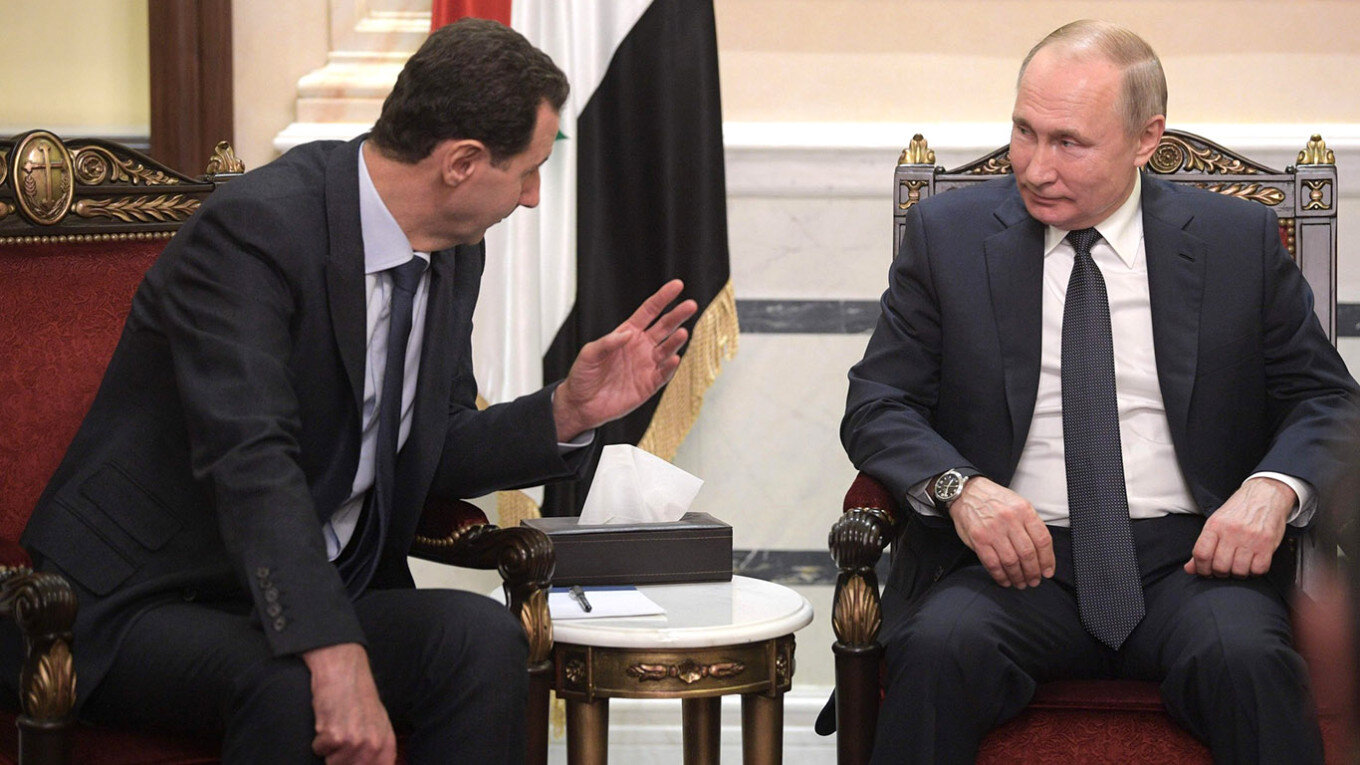
The Fall of Assad and Russia’s Strategic Dilemma: Shifting from Syria to Libya”
December 18, 2024 Caleb T (Dr.) Russia’s military presence in Syria, once a cornerstone of its strategy in the Middle East, faces significant uncertainty as the Syrian conflict evolves. Recent developments, including
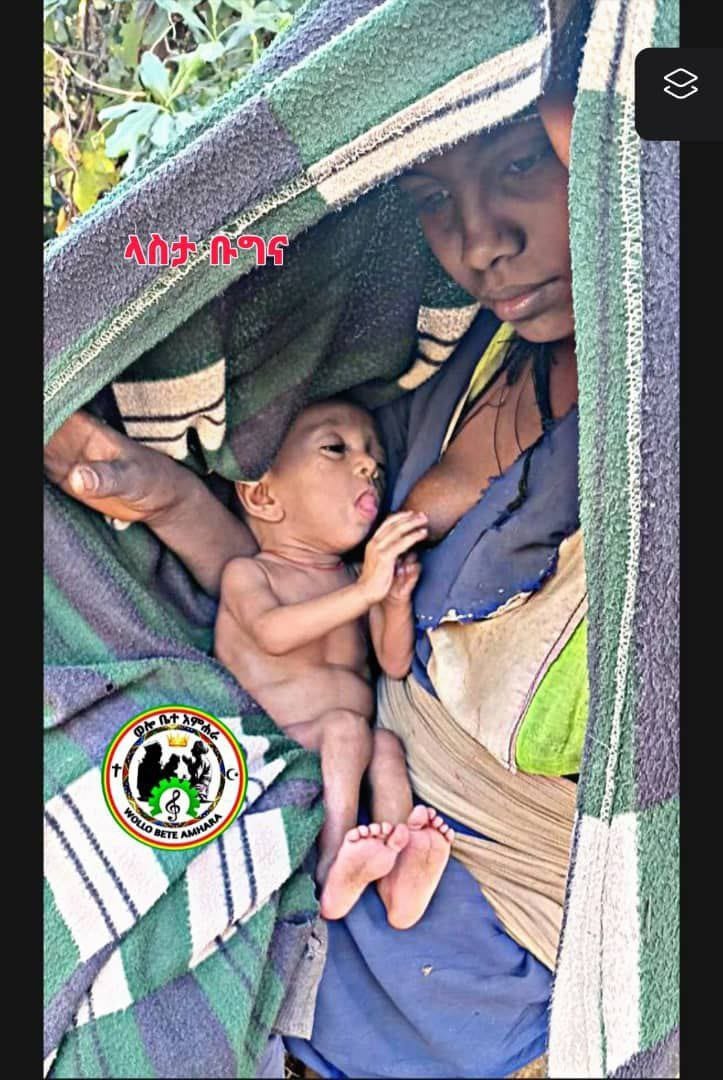
Urgent Humanitarian Crisis in Amhara: Addressing Essential Needs Amidst Ongoing Violence
( The Habesha ) The situation in Ethiopia’s Amhara region requires immediate international focus. The government led by Abiy Ahmed is perpetrating war crimes, employing tactics such as starvation and continuous drone

The African Auschwitz Version of the Amara – Ethiopia!
Yinegal Belachew The Polish city Auschwitz is known for the service it had given to the Nazis during the slaughtering by Hitlerians of the Jews. Despite the number of Jews massacred then

Ethiopia’s New Banking Legislation: A Double-Edged Sword for Domestic Banks
The recent banking legislation in Ethiopia signifies a major transformation in the nation’s financial sector, aiming to remove long-standing barriers that have restricted foreign banks from participating in the local market. This

Fano: The Unsung Heroes of Ethiopia’s Fight for Freedom
What is the Fano Movement? The Fano movement represents a collective of Ethiopian fighters, largely composed of young people, farmers, and rural militias. These fighters have historically resisted both foreign invasions and
